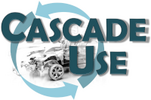External examples for cascade use
External examples for cascade use
In this section you can find external examaples for cascade use. How and where does people and companies use it?
Repurposed Materials
Please visit the website www.repurposedmaterialsinc.com/ to see examples for the REUSE of products. The company "repurposed materials" is adressing lots of innovative ideas around the reuse of products and a possible second life.
NOTE: Cascade Use has no intention of product placement. We just want to transport the idea of reusing materials.
The idea of repurposed materials:
"What is repurposing? It is taking a byproduct or waste stream such as a retired street sweeper brush and giving it a 2nd life as a backscratcher for horses or cattle. It is taking a decommissioned fire hose and giving it an extended life as a boat dock fender. It is taking an obsolete ski lift cable and giving it a second life as hand railing in a luxury condo building. Our company started focusing solely on material “repurposing” like in the examples above. You’ll find all kinds of crazy, offbeat industrial castoffs at our five different locations…Atlanta, Chicago, Dallas, Denver, Philadelphia…that could get a very different 2nd life."
For more information and inspiration visit their website.
"Tinkering ideas for the garden" using old car tyres
The idea to paint car tyres with bright colours and reuse them as flower planters and boxes is not a new one, but is certainly a creative possibility to recycle old car tyres. The fact is that a number of other ideas can be derived, with a bit of craftsmanship, from old tyres in the following blog:
Kreatives Upcycling aus Russland
n line with the historical machine named "Felix" from the 1930’s, the Moscow-based Alexey Butyrin gave his upcycling a modern take on the name with "Felix M".
He worked on a Casemod (changing the outer chassis of a computer for optical revaluation) for a total of five years. The parts are sourced from the Institute of Physics and Technology in Moscow.
More on the Heise website at:
www.heise.de/newsticker/meldung/Felix-M-Casemod-aus-sowjetischen-Elektronikbauteilen-3648435.html
If you are familiar with the Russian language, you will get more information on the blog:
bootsector.livejournal.com/56763.html
Car recycling explained for kids
Who does not remember these from their own childhood - the stories of mice explanations?
Pleasant but also factual, the concepts of car recycling are explained in a child-friendly manner in the following video.
<iframe frameborder="0" height="315" width="560" src="https://www.youtube.com/embed/jqvoxWmaz9s"></iframe>
Source: www.youtube.com/watch?v=jqvoxWmaz9s
This is also, of course, applicable to a slightly older audience.
Modular Future
The term modularity is widely used in studies of technological and organizational systems. Product systems are deemed "modular", for example, when they can be decomposed into a number of components that may be mixed and matched in a variety of configurations. The components are able to connect, interact, or exchange resources (such as energy or data) in some way, by adhering to a standardized interface
An example for the realization of modularity is Phonebloks. Phonebloks is an open-source modular smartphone concept created and designed by the Dutch designer Dave Hakkens, primarily to reduce electronic waste.
Here you can visit the official homepage of the project and here you can watch an informative video about Phonebloks.
Recycling: Mobile shelves for children from kits
If you have children, you can collect their vehicles – from carts to bicycles and tricycles of various sizes. Using the Infento system in Amsterdam, these vehicles can all be recycled.
The idea is innocuously obvious, but the way that Infento implemented the idea is innovative, namely: why not take the idea of Lego technology or metal kits and upscale the idea to scooters, tricycles, go-karts and other vehicles to be repurposable up to adolescents for everyday life?
Click here for the full article on heise.de .
Fairphone makers reveal production costs
230 Euro for components, 37 euro for the production: Fairphone openly lays out information that other producers do not wish to disclose. Additionally, the producer satisfies itself with a small profit margin.
Fairphone the only smartphone producer that openly discusses their costs and investments. Initially, this information was provided for their first model, but has subsequently been updated to include their Fairphone 2 model.
The link to the complete article can be found here.



